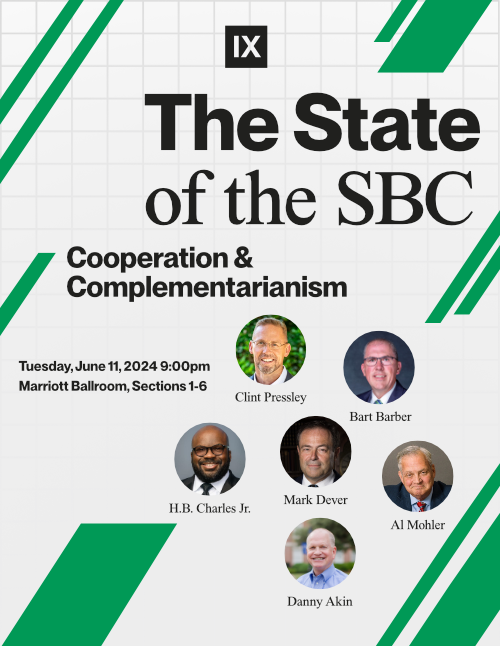Does Pornography Use Ever Justify Church Discipline?
At what point, if ever, does a persistent pattern of pornography warrant church discipline?
It’s an all-too-familiar scene. They’re sitting right across from you: their shoulders sag, their head hangs low in shame. If you can even see their eyes, you notice they look empty and exhausted.
But the point is, you’re here again. And your predictable questions about purity and pornography are met with their sadly predictable answers.
If you’re a pastor, I trust you have found yourselves in such situations. You’ve been meeting with someone, trying to help them through an addiction to pornography. And yet, for all the time and prayers, hopes and hugs, promises and good intentions, resolutions and moral resolve—nothing seems to happen. It all appears futile. It’s as if you’re sitting across from the living embodiment of Sisyphus. Once again, down the hill the rock rolls.
Is church discipline your only option? If not, what does true repentance look like?
WHAT IS REPENTANCE?
Repentance is not sorrow. For one can feel sorrow, and yet deep down still love their sin (cf. Lk 18:23; 2 Cor. 7:10-11). Nor is repentance evidenced simply in resolutions or remorse or regret or moral resolve.
Repentance is a radical change in one’s attitude toward sin that produces a corresponding change in action. Repentance is belief in action. It’s turning our backs upon our illicit passions so we can truly embrace God’s promises. It recognizes the allure of sin, but replaces it with the assurance of heaven. It exchanges what we think we must have (sin), for what God knows we most need (him). Repentance is not simply devoting ourselves to better behavior, but living for a better savior. It’s quite simply “turn[ing] to God from idols, so that we can serve the living and true God” (1 Thess. 1:9).
In other words, genuine repentance results in imperfect, halting, but genuine change.
DISCERNING REPENTANCE
To be sure, all of us have lived Paul’s lament in Romans 7: “For I do not do the good I want to do, but the evil I do not want to do—this I keep on doing. . . . What a wretched man I am!” The power of sin remains stubbornly strong—whether it’s alcohol abuse or anorexia, gossip or gluttony, cutting others with our words or cutting our own skin. Certainly none of us always repent completely or perfectly. Indeed, some Christians will walk with a discernible limp for life.
Yet the genuine Christian desires change. As much as they may feel defeated, they never concede defeat. They keep fighting. After all, being a Christian doesn’t mean your life is absent of defeat; it means that you stubbornly follow Jesus even in the midst of defeat. During some seasons, it may feel like we stumble more than we stand, but we resolve to stand again. For no true Christian finally declares a truce with sin.
Not only does a genuine Christian desire change, but their life gives evidence of change. It may be imperceptibly slow, and might accompany great struggle, but over time there will be some discernible change.
DOES PERSISTENT PORN USE WARRANT CHURCH DISCIPLINE?
Now to the pressing question: when persistent patterns of pornography persist, is church discipline ever warranted?
From Scripture, I understand corrective church discipline is required when sin is demonstrable, serious, and unrepentant.
Is pornography demonstrable? Unlike pride, for example, is it clear and objective, not left up to conjecture and interpretation? Though our courts have struggled to define it, to paraphrase the famous line from Justice Potter Stewart: “We know it when we see it.” Sadly, nearly any adolescent can testify to that fact today. So, yes, pornography use is demonstrable.
Is it serious? Given the way it denigrates those made in God’s image; given the way it treats others as base objects and tools of sexual gratification; given the way it rewires the brain, distorts the gift of sex, and destroys marriage; given the way it makes us complicit with the sex trade and thus violates the clear command to love our neighbor—there is no doubt of pornography’s seriousness. Yes, pornography use is serious.
Is it unrepentant? This is far and away the most difficult question. Discerning repentance will nearly always be a judgment call, and we don’t want to call for the Spanish Inquisition with every stubborn addiction. And yet, we also don’t want to create a culture in which individuals are fearful to be honest and transparent about their struggles, or where they’re encouraged toward legalism.
While there’s no simple formula, the more we answer “yes” to the following questions, the closer we move toward a disciplinable offense.
- Is there a settled coldness or indifference to the sin?
- Have they ceased fighting and largely made peace with their sin?
- Are they no longer ashamed at the severity of their sin?
- Do the warnings of Scripture no longer carry any weight?
- Do they find ways to make excuses rather than own up to the consequences?
- Do they no longer pursue counsel?
- Jesus calls us to embrace radical solutions in order to cut sin out of our life (Mt 5:29). Are they increasingly unwilling to embrace such solutions? Are they quick to explain why such radical solutions aren’t required?
- Is the sin becoming more frequent and/or more deviant?
- Has it persisted for a prolonged period of time, not just weeks and a few months, but many months or years?
- Is it increasingly causing damage in their relationships with their spouse (if they’re married), or their relationships with other church members?
Even if you find yourself answering “yes” to many of the questions above, you still must weigh such things as: the health of the congregation; the receptivity and maturity of the body when it comes to discipline; the past practice of discipline; and the respect of the elders/leadership among the body.
And yet, if we always and only decide on inaction, we should consider the effect this might have on erring sheep (who need to repent), weaker sheep (who are at risk of being led astray), and those who aren’t sheep at all (who need not be confused about what it means to be Christian).
Shamefully, the sin of pornography is common inside the church. We should be quick to walk with brothers and sisters engaged in the fight. And we should be willing to walk with them for a long time—as long as the ember of that fight still glows.
But when that ember goes dark? For the sake of our marriages, for the sake of the purity of our corporate witness, and for the sake of the person enslaved to sin and self-deception, we must be willing to pursue church discipline for members who unrepentantly persist in engaging in pornography.
If such an option isn’t even on the table, what does that say about the church and its posture toward this increasingly common sin?









